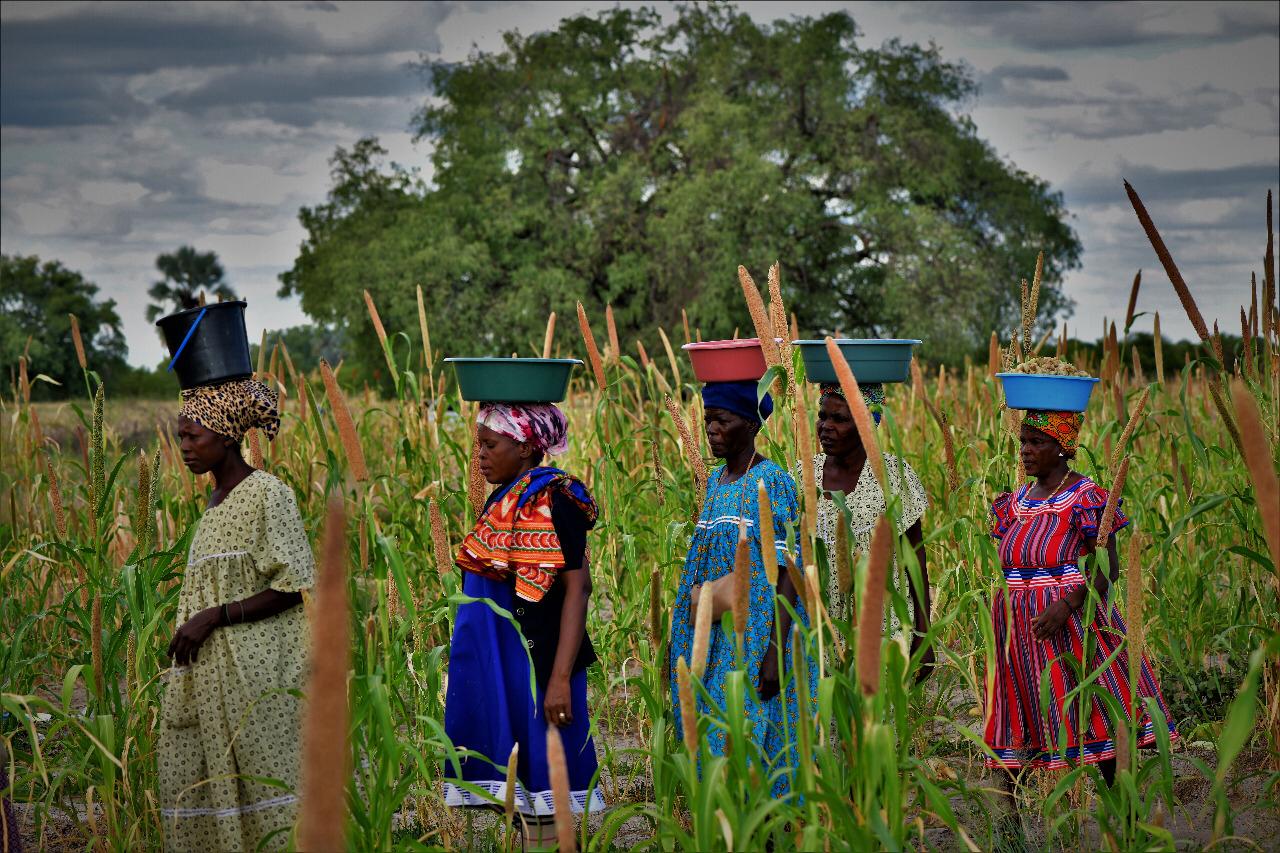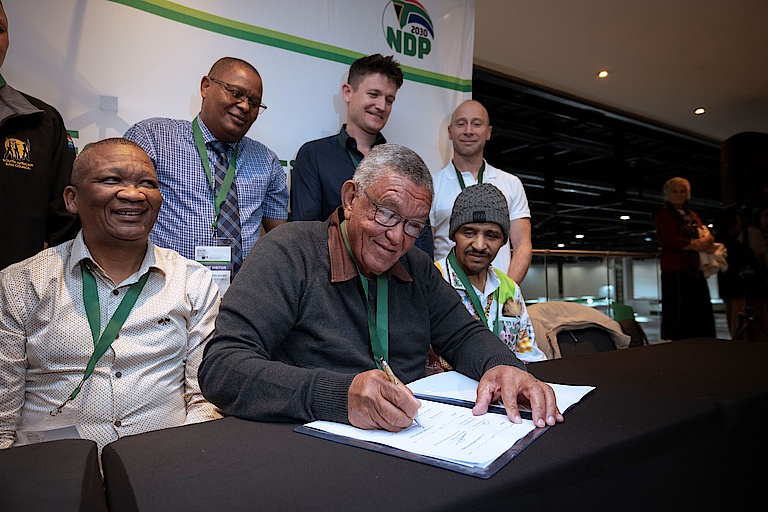African Biotrade Festival (ABF) - September 2023
ABioSA with its partners the DFFE, the dtic and BIA developed and implemented the first African Biotrade Festival (ABF) in September 2023. Held in Johannesburg in collaboration with the 2nd Organic & Natural Products Expo Africa (O&N), the festival attracted more than 4,000 visitors including 550 dedicated ABF registrations. Supported by the Swiss, German and South African governments, the event was a great strategic and commercial success. Technical partners for the event included SIPPO, SSAIP, UNIDO GQSP, SANBI, GEF-6 and BioPANZA. Feedback from the biotrade sector, government and small businesses has been overwhelmingly positive and there is broad support for the event to be sustained and expanded. Discussions are underway for a 2024 ABF to be funded and coordinated by the BioPANZA leadership of DFFE, dtic and DSI. The ABF featured six pavilions dedicated to high-potential biotrade species and their sector organisations, and one specialist pavilion to showcase biotrade research, testing and standards. Species on show included Baobab, Marula, Buchu, Sceletium, Honeybush and other indigenous species used for essential and vegetable oils.
Also exhibiting were more than thirty small businesses promoting indigenous plant-based products and ingredients, along with 130 exhibitors at O&N. Exhibitors and delegates represented countries including Botswana, Zimbabwe, Namibia, Cameroon, Madagascar and Côte D’Ivoire. Among many highlights at the event was the historic signing of an Access and Benefit-Sharing (ABS) agreement between the Buchu Association, the SA government represented by DFFE, the National Khoi Council and the South African San Council.
Implementation of sector development plans - Nov 2022 – Aug 2024
During its first phase ABioSA supported the creation of detailed sector development plans (SDP) for key biotrade species. The project is now supporting South African and regional organisations with their implementation of the SDPs, including the Buchu Association, the African Baobab Alliance in collaboration with BioInnovation Zimbabwe, and the South African Honeybush Tea Association in collaboration with Garden Route Biosphere Reserve (GRBR). Parceval is leading a consortium working with the Southern African Botanical Products Association to develop the Sceletium sector.
Details of select biotrade species can be viewed here
Financial support for small businesses
ABioSA has provided technical and financial support to 23 SMMEs during its two phases. In phase one, two rounds of grant funding focused on high-impact value chains based on ABioSA’s initial 12 target species. The funding aimed to help small biotrade businesses to overcome regulatory hurdles and develop new innovative products. A first round of support was aimed at advanced SMMEs and business support organisations, with nine participating organisations including a laboratory and a Zimbabwean SMME. The second round focused on six early-stage South African, Zimbabwean and Zambian SMMEs which have a product but need help to improve quality, expand their market and develop new products. Grant funding during ABioSA phase II is focused on the species for which sector development plans have been supported by ABioSA, and was aimed at early-stage SMMEs.
Mentoring and support for SMMEs
ABioSA has provided technical support and mentoring to nine emerging SMMEs on internal quality systems, as part of their journey to regulatory compliance and access to new markets. The mentoring included Good Manufacturing Practices (GMP ), Good Agricultural and Collection Practices (GACP) and Hazard Analysis Critical Control Point (HACCP). It was based on International Organization for Standardisation (ISO) standards. The companies’ operations and quality controls were assessed, and a Quality Management Systems (QMS) manual developed for each business. A self-assessment was completed by all SMMEs, and then an internal audit conducted by a contractor, enabling guidance to be provided on how the business could improve their quality standards and prepare for ISO accreditation.
SDP peer learning - 2023 and 2024
ABioSA has run peer learning events with the implementers of sector development plans , with topics including preparation for trade fairs and exhibitions, monitoring and evaluation, and funding models. Workshops scheduled for 2024 will cover industry needs and BioPANZA support, and a case study from the SA Rooibos Council on its lessons learned over the past seven years.
Biodiversity legislation update
ABioSA is supporting the updating of data underpinning South Africa’s National Biodiversity Economy Strategy (NBES), following a request from the Director General of the Bioprospecting & Biodiversity Economy directorate in the Department for Forestry, Fisheries and the Environment (DFFE). This will allow South Africa to assess the growth of the biotrade sector since 2013.
SMME directory
ABioSA is supporting the updating of data underpinning South Africa’s National Biodiversity Economy Strategy (NBES), following a request from the Director General of the Bioprospecting & Biodiversity Economy directorate in the Department for Forestry, Fisheries and the Environment (DFFE). This will allow South Africa to assess the growth of the biotrade sector since 2013.
Marula SDP - EU Novel Food application
ABioSA supports the Marula EU Novel Food application. Activities scheduled for 2024 include collection of Marula fruit samples, testing for substances of concern, and communication with industry on the findings. Preparatory work is underway for a future notification to the European Food Safety Authority (EFSA), including a strategy for an appropriate regulatory route, and identification of risks, future funding requirements, and possible funding sources. This will be a significant milestone on the road to regulatory approval.
Marula Indaba
In November 2023 ABioSA joined DFFE and SAEOPA to host a Marula Indaba in South Africa’s Limpopo Province. It brought together producers, processors, buyers, harvesters and the public sector, aiming to focus on the aims and progress of the Marula sector development plan, including improved market access, sustainable management of Marula, improved quality and guidance on regulatory compliance. A follow up Marula Indaba is scheduled for later in 2024.
Community engagement pilot project in the Honeybush sector
A successful Honeybush community pilot brought a different dimension to community inclusion in the Honeybush value chain. From June to August 2023 a series of facilitated community workshops were held in the southern Cape with participation from national and provincial government, Khoe Khoe indigenous leadership, community leadership, local community members (elders, youth and women), wild harvesters, local processors, traditional healers and knowledge holders.
Also attending were farm workers, researchers, donors and small/medium local and indigenous enterprises in the Honeybush sector, and the SA Honeybush Tea Association. Online sessions enabled participation by NGOs, universities, research and conservation agencies, and consultants from GIZ ABS-CDI affiliated projects. The purpose of these sessions was to enable communities to articulate their current and future roles in the Honeybush value chain, not just as beneficiaries but active participants in value creation.
Knowledge products
ABioSA has produced multiple knowledge products during its two phases, including films, case studies, species profiles, technical guides and event reports. The information is available in the respository of this website.
Post graduate initiative
Six students were selected and coached by ABioSA to present their research at the African Biotrade Festival (ABF), with three students then selected to attend an international conference in 2024. The students represented Stellenbosch University (SUN), Cape Peninsula University of Technology (CPUT), Bindura University of Science Education (BUSE), Rhodes University, and Vaal University of Technology (VUT). Summaries of the student research, and its contribution to the wider biotrade sector, are being developed as future ABioSA knowledge products.
Their presentations are available under "events/workshops" int the project's repository:
Biotrade stakeholder forums
ABioSA has continued its successful programme of Biotrade Stakeholders Forums in collaboration with the United Nations Industrial Development Organisations (UNIDO) Global Quality and Standards Programme South Africa (GQSP-SA).
- The 15th Biotrade Stakeholder Forum (hosted by ABioSA) was in February 2022 with the Department of Agriculture, Land Reform and Rural Development (DALRRD) and included a review of South Africa’s national strategy for indigenous food crops.
- The 16th Biotrade Stakeholder Forum (hosted by GQSP) was in May 2022, with a resource efficiency self-assessment tool for SMMEs presented by the Green Industry Platform.
- The 17th Biotrade Stakeholder Forum (hosted by ABioSA) was in August 2022, and used to celebrate women in biotrade in collaboration with ABioSA’s SECO-funded sister projects UNIDO/GQSP-SA, SIPPO and the Swiss South African Intellectual Property Project.
- The 18th Biotrade Stakeholder Forum (hosted by GQSP) was on 21 February 2023, featuring the SheTrades Programme, UNDP/GEF 6: Honeybush Grant Finance supporting community-based enterprises in honeybush farming, and Ecosystem Development for Small Enterprises (EDSE).
- The 19th Biotrade Stakeholder Forum (hosted by ABioSA) was on 20 June 2023, with briefings on the African Biotrade Festival.
- The 20th Biotrade Stakeholder Forum (hosted by GQSP) was on 24 October 2023 with a report back on the African Biotrade Festival.
Presentations at UEBT Conference in Amsterdam
South Africa was chosen as partner country to report on and assess possibilities for ethical sourcing at the October 2023 UEBT Conference. Presentations from South African participants, including DFFE, SANBI, Parceval and the Buchu Association, highlighted ABioSA support for development of the biotrade sector, strengthening industry associations, facilitating ABS agreements or contributing to developing national standards.
Indigenous Plants Use Forum
ABioSA was represented at the August 2023 Indigenous Plants Use Forum held in the Kruger National Park, with discussions including the challenges of biotrade commercialisation. Delegates heard that of the hundreds of southern African medicinal plants which have been researched for their commercial potential, only three products have successfully accessed EU markets with claims under traditional medicines’ regulation, and three have made it with pharmaceutical claims.
SMME business breakfasts
The DFFE, with support from ABioSA, hosted a series of SMME business breakfasts to address biotrade issues and help SMMEs increase their local and international market access for value-added natural ingredients. The events cover topics including generic marketing, preparation for events, meeting customers and finding international market opportunities, and a positive approach to access and benefit sharing.
ABioSA at COP15
ABioSA was represented at the 15th Conference of the Parties to the Convention on Biological Diversity (COP15) in Montreal, with a presentation focused on sector development plans for key biotrade species.
STUDY ON COMPLIANCE WITH EU REGULATORY REQUIREMENTS
To enable greater compliance of SME products for export, a study was conducted to inform a strategy regarding EU cosmetic, personal care and food markets. The EU regulatory requirements for indigenous oils were explained in a feedback session, where findings and recommendations from the study were also presented. The project is currently supporting response to those gaps identified as barriers to entering the EU market.
REGIONAL WORKSHOP ON EMERGING MARULA SECTOR
A regional Marula workshop was held in November 2019 in Namibia, with more than 50 delegates from Botswana, Namibia, South Africa and Zimbabwe; including harvesters and primary producers, the development sector, government and its implementing agencies, and manufacturers and traders of Marula products. The workshop discussed the need for a coordinated and collaborative approach to the creation of a successful economic sector. It was agreed that the emerging Marula sector must take account of ABS regulations, indigenous knowledge and conservation and sustainable use. It needs to be aligned with national and local priorities and initiatives and requires coordination and consultation with stakeholders. Reliable supply, quality standards and market access were identified by delegates as priority elements for a future sector development plan.
WORKSHOPS ON FINANCE, COMPLIANCE AND BUSINESS WRITING
Three workshops on finance, regulatory compliance and technical business writing were held for 22 SMEs selected for the ABioSA capacity development programme. The workshops aimed to strengthen the companies and prepare them for financing. Training for SMEs in sustainable reporting was conducted in collaboration with the Global Reporting Initiative.

